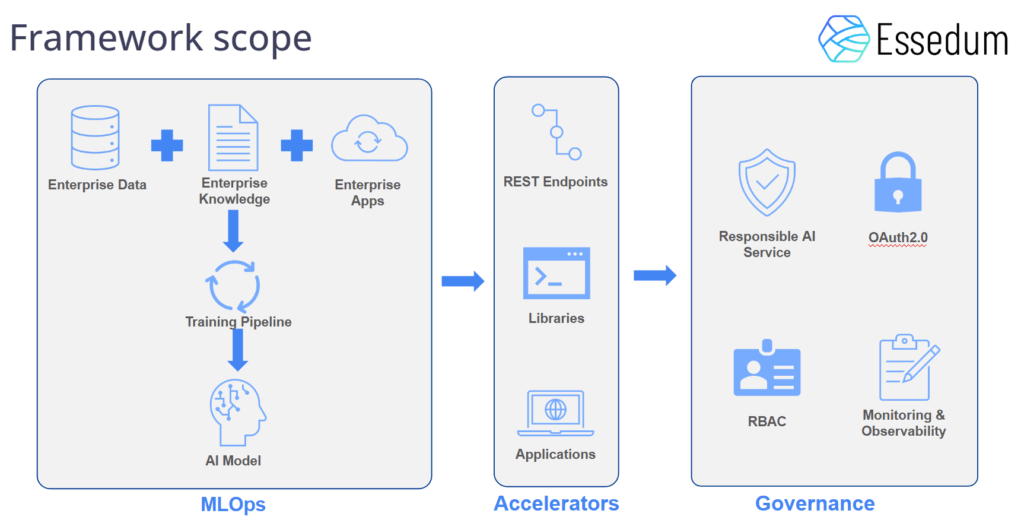The Linux Foundation reaches a milestone in integrating artificial intelligence into network environments with the launch of Essedum Release 1.0, a project promising smarter, autonomous, and more agile networks.
LF Networking (LFN), one of the Linux Foundation’s key consortia for developing open networking projects, has announced the availability of Essedum Release 1.0, the first stable version of a modular platform designed to accelerate the adoption of AI-based network applications.
This launch marks a significant step toward creating AI-native networks, meaning networks built to incorporate AI at every stage of operation. The project — contributed by Infosys, a Premier Member of LFN — offers a comprehensive framework that covers data ingestion, model deployment, and orchestration of training and inference pipelines.
A modular platform for AI in networks
Essedum 1.0 provides key capabilities that will enable operators, developers, and providers to build intelligent network solutions more quickly and efficiently. Its main features include:
- Connections: Integration of systems via secure links for data exchange across multiple environments.
- Dataset Management: Data ingestion from storage buckets, MySQL databases, or REST APIs.
- Pipelines: Creation and management of training and inference workflows for AI/ML models, with options for fine-tuning and deployment.
- Models: Access and management of models from on-premises infrastructure or public clouds such as AWS SageMaker, Azure ML, and GCP Vertex AI.
- Endpoints: A centralized interface to monitor APIs and deployed model services.
- Adapters: Simplified integration with external services without complex configuration.
- Remote Executor: Running programs or pipelines on remote servers to optimize intensive computing loads.

Collaboration and the future of Essedum
The project is not only a contribution from Infosys but also incorporates components developed by the LFN AI Task Force, such as the Data Sharing Platform and Thoth (Anuket). This collaboration reflects the Linux Foundation’s strategy to drive AI-specific infrastructures through an open and community-driven model.
Arpit Joshipura, Director General of Networking, Edge, and IoT at the Linux Foundation, highlighted during the launch:
“The release of the first version of Essedum marks a significant milestone for the open networking industry, placing AI-powered capabilities at the core of network applications. This launch accelerates the integration of artificial intelligence into our infrastructures, enabling more agile and autonomous systems that will drive innovation across multiple sectors.”
Upcoming enhancements for Essedum include support for automated deployments with Docker and Helm, ingestion of PDF and Excel files, advanced secret management, more sophisticated access controls, and increased compatibility with public cloud providers.
Community testing sandbox
To facilitate adoption and experimentation, the Essedum community, in collaboration with the Interoperability Lab at the University of New Hampshire (UNH), has made a Sandbox available where anyone interested can test the platform’s capabilities in a replicable environment.
Essedum and the challenge of AI in networks
The arrival of Essedum 1.0 responds to a growing need in the sector: managing increasingly complex and dynamic networks through intelligent tools. As data volumes grow and demand for real-time services skyrockets, infrastructures must evolve toward a self-driven model capable of making automatic decisions based on predictive analytics.
The Linux Foundation, with this launch, sends a clear message: the future of telecommunications, cloud, and edge computing depends on the integration of AI into the network, and that future will be built on open source.
Frequently Asked Questions (FAQ) about Essedum 1.0
1. What exactly is Essedum?
Essedum is an open-source project from LF Networking that provides a modular platform to integrate AI into networks, from data ingestion to machine learning model deployment.
2. Which companies contributed to Essedum?
The project was initiated by Infosys, a Premier Member of LFN, and also incorporates components developed by the LFN AI Task Force with collaboration from the open-source community.
3. How does Essedum differ from other AI platforms?
While many platforms focus on general applications, Essedum is specifically designed for the network sector, making it a unique tool to build AI-native infrastructures.
4. Can I try Essedum without deploying it in production?
Yes. The community has created a Sandbox in partnership with the University of New Hampshire, where you can experiment with Essedum in a test environment before deploying in real-world scenarios.
5. Which sectors will benefit most from Essedum?
Telecom operators, cloud service providers, edge computing companies, and any organization managing complex networks with high automation and intelligence demand.
via: linuxfoundation and Essedum

